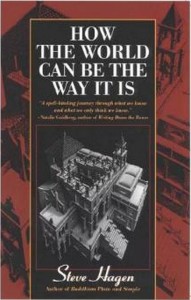 How the World Can Be the Way It Is: An Inquiry for the New Millennium into Science, Philosophy, and Perception Zen and Quantum Theory are really hard for me to wrap my head around, and Steve Hagen has big dollops of both in this book. I followed maybe 75 percent of the book. The stuff I highlighted won’t make much sense out of context but this is for my reference, so…
How the World Can Be the Way It Is: An Inquiry for the New Millennium into Science, Philosophy, and Perception Zen and Quantum Theory are really hard for me to wrap my head around, and Steve Hagen has big dollops of both in this book. I followed maybe 75 percent of the book. The stuff I highlighted won’t make much sense out of context but this is for my reference, so…
For it is sufficient, I think, to live by experience, and without subscribing to beliefs — Sextus Empiricus
(To believe, to hold an opinion) refers to a state of mind which we are powerless to choose.
His mind was changed because it was overwhelmed by a new awareness. In the moment in which he became aware of something new, his mind was different.
We must learn to rely solely on what we see rather than upon what we think.
We proselytize others because it makes us feel better. And the reason it makes us feel better is because we’re unsure of what we believe ourselves.
(Being fully awake is) Seeing without any mental bias — without concepts, beliefs, preconceptions, presumptions, or expectations.
You can’t choose to doubt.
We should always be prepared to take another look at what we believe and begin to doubt it. […] We should doubt until we no longer hold fast to any thing at all.
Whatever you think, is delusion.
“The world is not objectively real but depends on the mind of an observer.” — John von Neumann
The mind is what the brain does.
Apart from their functions, relationships, and components, we do not seem to know what things are at all. […] A thing receives its identity as much from what it is not as it does from what it is. […] When an object appears in the mind, we conceive it as a solitary thing unto itself. […] It is only as singular entities that our objects of consciousness can form in our mind. […] All things receive their identity as much from what they are not as from what they are. […] Spring can only be spring if we account for what it is not (e.g., summer) as an intrinsic part of its identity.
“How can one be ‘wrong’ about what one actually perceives?” — Roger Penrose
We simply have no direct experience of anything outside the mind. And to assume the existence (or, for that matter, he nonexistence) of anything outside the mind simply contradicts direct experience.
Three types of “recognition”
1) Naming a thing (labeling and categorizing. Purely conceptual)
2) What the thing does (function and utility)
3) Just seeing (pure perception, no conceptual overlay)
The more we learn about quantum physics, the more the universe appears like a thought rather than a thing. (Pointed out by Sir Arthur Edington)
Consciousness
It’s because we can easily conceive of (but never perceive) a time or place outside of our consciousness that we persist in holding this belief (that matter precedes consciousness) […] We never directly experience a time (or anything else) which precedes consciousness.
We don’t actually experience Consciousness Itself “originating” anywhere, or anywhen. Consciousness — the awareness that “something’s” happening — is ever-present and immediate. We never directly experience Nothing.
Consciousness (is) the originator, instead of the product, of place and time.
No one is ever conscious of not being (or not having been) conscious.
Consciousness is the conceiving (the making) of parts, or mind-objects, from the Whole. […] The “parts” — the physical and mental objects of consciousness, i.e., concepts — are merely appearances resulting from the working of Consciousness.
Consciousness splits the Whole, immediately creating an ego — an identity — which then sees all other things in opposition to it.
To gain information is merely to sink deeper into conceptual reality. […] We gain information at the expense of wisdom.
What you or I do right here, right now affects everything that ever was, is, or will be. Whatever you do is constantly affecting everything that has ever happened or will happen.
We “exist” not in being but in becoming — and in fading away.
We do not experience an I — we assume it. We only experience perception, thought, and consciousness.
